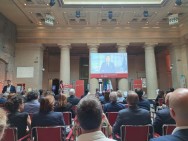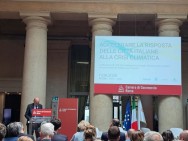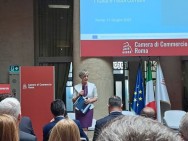- Home
- International relations and projects
- Let’sGOv: Italian cities on the frontline for the climate
Documenti
- European Policy Brief.pdf (516Kb)
Let’sGOv: Italian cities on the frontline for the climate
Rome,
June 11, 2025 - The Temple of Hadrian Hall at the Rome Chamber of Commerce
hosted the event "Accelerating Italian Cities' Response to the Climate
Crisis," a forum for dialogue among European, national, and local
institutions on the challenges and opportunities of the transition to climate
neutrality. At the heart of the initiative was the European Union's
Mission "100 Climate-Neutral and Smart Cities by 2030," which includes
nine Italian cities-among them Bologna-working together on an ambitious path to
tackle climate change.
The event strongly emphasized the
strategic role of cities in the fight against the climate crisis, highlighting
how Climate City Contracts are turning urban areas into real laboratories of
innovation. The nine Italian mission cities-Bergamo, Bologna, Florence, Milan,
Padua, Parma, Prato, Rome, and Turin-have already planned over 1,000 concrete
actions and engaged more than 600 stakeholders, including businesses,
universities, public institutions, and civic organizations.
Bologna played a leading role in the event, represented by Mayor Matteo Lepore, who spoke on the first European plan for climate adaptation, and by Councillor Anna Lisa Boni, Italy's national contact point for the Climate Mission 2030. Boni presented the achievements of the Italian cities, focusing particularly on innovative initiatives. Bologna thus confirms its leadership not only in environmental planning but also in steering co-creation processes with the other participating territories.
One of the day's highlights was the presentation of the "Recommendations to the National Government," jointly drafted by the EU Mission cities as part of the Let's GOv project. This initiative aims to strengthen the role of cities in climate transition governance and has been instrumental in formulating practical proposals addressed to Environment and Energy Security Minister Gilberto Pichetto Fratin, who took part in the discussions.
The main requests made to the Government include:
1. Strengthening coordination across institutional levels (municipal, regional, national);
2. Creating a national data platform to improve monitoring of local climate policies;
3. Supporting Renewable Energy Communities with incentives and advisory tools;
4. Setting up a national funding roundtable to facilitate access to resources and overcome bureaucratic hurdles.
With an estimated investment value of €40 billion in public and private funds-and €4.8 billion in EU resources already mobilized (including €3 billion from the National Recovery and Resilience Plan)-Italian cities are demonstrating how climate transition can also drive economic development, social cohesion, and urban innovation.
The event concluded with a shared commitment between the Ministry and the cities to establish a permanent forum on climate policy, aimed at strengthening the role of local administrations in achieving European goals. The meeting marked a key step forward in building a national network for climate neutrality, with Bologna standing out as one of its most active and authoritative leaders.
Ultimo aggiornamento: martedì 25 novembre 2025









